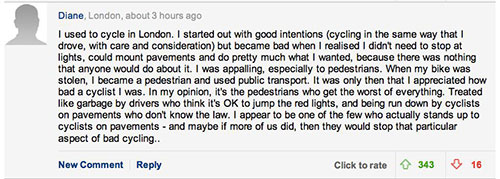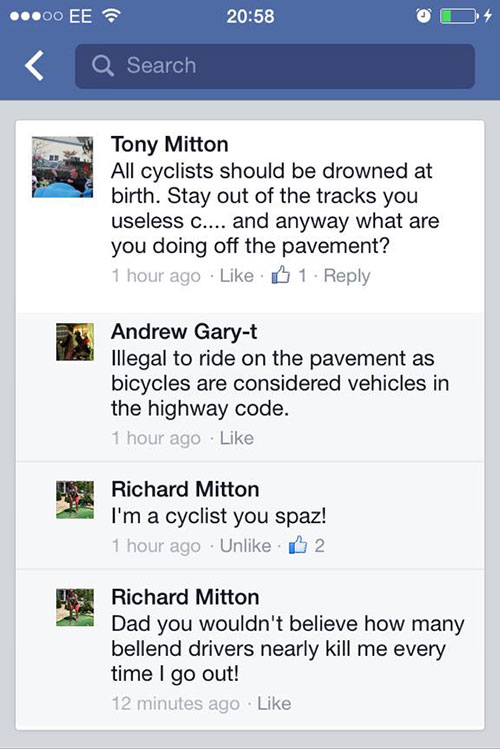Bikes are indeed beautiful machines. [twitterer]
The lights are on…
I've remarked recently about some of the big bike lighting mistakes, and it's always great to find someone who agrees with you:
what if the gear you bought to keep you safe was actually putting you in the way of more harm than good? What if that light does a brilliant job of illuminating dark backroads, but conversely is too much for urban use?
…If you are looking into a bright light coming towards you, you will be impaired and at risk of being temporarily blinded, not good when you are in control of a two-tonne vehicle.
So if your lights dazzle you when they reflect off street signs, think about turning them down a notch. Or ten.
What ails ye: bike as cure and cause
A long time ago, I observed that when it comes to day-to-day ailments, there ain't much that a good long ride can't fix. On Ready, Bike, Ride! this week, a little more subtlety on the subject:
While mental suffering from feeling low down, depressed or hung over on the bike can usually be washed away with a vigorous leg and lung workout on the bike, there's also the realm of physical suffering on a ride.
Speaking of what riding does for your physical wellbeing, Lillie Rumpf reckons:
Riding a bike while pregnant is awesome!
MHL
ABC's Media Watch dipped into the mandatory helmet legislation debate the other day:
In recent weeks it has challenged the idea that "terrorists are crazy" and that "corruption never serves a useful purpose."
And next week Susan Carland enters dangerous territory again
I'm not a close follower of the so-called 'helmet debate' (my interest definitely waxes and wanes) but I am a long-term observer, and I'm really not convinced that a five-minute TV slot does justice to the discussion. Ten minutes on the wireless allows for a bit more nuance, but is probably not enough either.
Alan Davies makes an interesting follow-up question: Is questioning the bicycle helmet law being contrary?
I don't like your data
A review of evidence found that Frome Street bikeway reduces traffic in Adelaide. But local councillors are not satisfied:
"I am not necessarily swayed by the findings. I tend to think that we have to listen to the people that pay the bills."
And also
"It's not always scientific evidence that will win the day … that is very much determined on the methodology used and the timing.
What we need is some unscientific anecdata that supports our preconceived notions. [twitterer]
But it gets worse:
Former lord mayor Stephen Yarwood has criticised Adelaide City Council after it voted last night to redesign Frome Street bikeway, against the recommendations of its own independent report.
And Bicycle SA gets all infographic on the data.
On the other hand, why cycletrack networks should be the next great American transit project:
"The old adage if you build it, they will come is absolutely true," Klein said. "If you fill all the streets with cars, people will think they're supposed to drive. When you start to build these protected bike facilities, it's a complete game-changer."
What on Earth!
[via The Sticky Bidon]
Escalating the price of error
Bez recently made this observation:
The victims of these elevations of the price of error are found not just on bicycles, but on foot, on horseback and indeed inside motor vehicles. Worse, there are more examples every day. Many, many more. It's just that most such examples go unnoticed (at least, by most people) by sheer fortune of no error or misfortune occurring. But every close pass, every moment of tailgating, every assumption of some error not happening in the path of a fast and heavy vehicle, is the elevation of the price of that otherwise barely-consequential error or misfortune to someone's physical welfare or even their life.
Don't project your shit onto me
This says far more about the writer than it does about cyclists in general:
Sabotage
Following dangerous sabotage incidents in the UK (welcome to the world of #boulietacks by the way), The Guardian asks what have people got against cyclists?
Another paradox is that even as cities such as London and Bristol are, finally, building segregated bike lanes, proven to be the best way to prevent such deaths, the tone of the debate around cycling has arguably become more polarised and poisonous than ever. Some campaigners worry that the sabotage incidents are linked to a public and media narrative in which cyclists are demonised equally as both anarchic lawbreakers and smug, humourless killjoys, sausage thighs squeezed into unsightly DayGlo Lycra.
Never read the comments, by the way. [twitterer]
The blame game
Dr Marilyn Johnson of Monash University quoted by @MichaelOReilly_:
"Typically, cyclists are hyper-vigilant, hyper-alert and make sure they stay safe. When a crash does occur, it can be due to the driver's behaviour (most likely) or the cyclist failing to be hyper-vigilant and failing to avoid the situation (sometimes) or it's due to the cyclist's own unlawful behaviour (rarely)."
But fear not, the NSW Police Force is taking action:
Officers from the Traffic and Highway Patrol, along with Surry Hills, Sydney City, Redfern, Leichhardt, Newtown, and Harbourside Local Area Commands will be out in force today to conduct Operation Pedro 5, focussing on cyclist and pedestrian safety in the Sydney CBD and surrounding road networks.
Looking after "cyclist and pedestrian safety" sounds good. So they'll be checking driver behaviour then—speeding, distracted driving, staying out of bike lanes, appropriate overtaking clearance, and so on? Ah, no…
The operation will run today (Thursday 25 June 2015) from 6am to 6pm and will focus on non-compliance by cyclists for helmet use, negligent or aggressive riding and disregard for road rules in order to deter poor road user behaviour.
[Head meets desk repeatedly and forcefully]
BikeSydney slams police operation targeting inner city riders as an 'embarrassment', quite rightly:
Sydney's bike lobby has launched a withering attack on the State Government after a 12-hour police blitz on inner city riders resulted in more than 600 infringement notices being issued.
President of BikeSydney David Borella said last week's operation at main city intersections was an "embarrassment".
"Umm…present company excepted"
Not sure I want one of these right near my bottom
Bicycle-mounted device projects signals on cyclists' backs [twitterer]
And I don't think my arse needs a rear-view radar either.
On the other hand, we could possibly use more of this kind of radar technology:
Thanks to a device called the Bicyclist and Safe Monitoring Applied Radar Technology (BSMART), developed by Codaxus, LLC, Simmons knows to the inch exactly how close drivers come to him.
Where's my hoverboard driverless car?
The Urbanist asks would a world of driverless cars be all beer and skittles?
Maybe, maybe not. Development (and plenty of talk) around this technology will undoubtedly continue, but whatever your thoughts on the idea of sharing the roads with robot cars, consider the important point of how self-driving cars could improve the lives of the disabled.
The loneliness (and fatigue and irritability and unhappiness) of the long-distance commuter
Long commutes make you fat, tired, and miserable:
Even setting aside obesity and blood pressure, commuting makes us unhappy in all sorts of other ways.
…The Gallup poll also found that those with longer commutes report spending more time worrying, feeling less well-rested, and experiencing less enjoyment in life in general.
Rip it up
ABC RN's Off Track asks:
When mountain bike riders clear unauthorised trails, move earth and install jumps in a patch of bushland, they're the baddies, right? Not necessarily. Every visit to the wilderness causes an impact, and the challenge for conservation managers is balancing that while trying to help people maintain a connection with nature.

